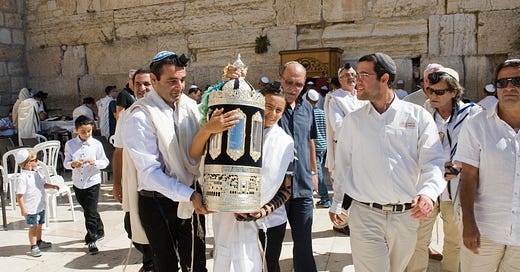Tween Torah & Teenager
"As we gear up for a bar mitzvah, I wonder what it takes to feel at home."
By Abigail Pickus
We’re sitting in the rabbi’s office discussing the dvar torah my son will be delivering at his upcoming bar mitzvah.
Everyone in the room is quite energized by the topic, except for one notable exception: the bar mitzvah boy himself.
Did I say ‘boy?’ I’m sorry, I meant man-cub, that contradiction that is the tween male, with his impossibly narrow frame and long legs that seem to grow every night so that by morning his pants are what my mom refers to as ‘floods’.
If his body is sprouting like a weed, his internal landscape is constantly churning, one minute he’s relatively content and the next, he’s moody and sullen or even growly. Oftentimes he’s sleepy and he’s mostly (always) hungry.
This, my dear reader, is exactly what has become of the sweet boy who it seems only a blink of an eye ago was playing in the very same playground outside the window of the rabbi’s office that we find ourselves now. I can see him as he was then: sweet faced with big blue eyes and overgrown hair turning to curl, running and chasing and enjoying himself with his preschool buddies.
And now here we are, approximately 162 days (“but who’s counting”) from when he will stand before family, friends, and the Holy One themself, to take on the yoke of commandments that is becoming a bar mitzvah.
Which is why the rabbi continues to impart upon my boy the many possible themes of his Torah portion, Lech Lecha.
“You only need ONE BIG IDEA,” he tells him, offering up some potential themes.
And really, the possibilities are so great I can’t help but jump in: the idea of the covenant, of becoming a great nation, of a homeland.
“What do you think of the fact that God promised the Jewish people that we would be as numerous as the stars in the sky and the sand on the sea? Are we that numerous?” the rabbi asks.
My son suddenly perks up. “The Jews are only .2% of the world population,” he says. How he knows this is beyond me but it’s consistent with one of his favorite topics: How few Jews there are in the world yet how persecuted we seem to be. How everyone else in America is lucky enough to celebrate Christmas and eat cheeseburgers and pray to Jesus.
Let’s quickly move past the moment where I actually tried to buy three stockings to put on our “mantle,” with initials for each of our names: Mama, son, and dog, as a way to placate my boy, even as I send him to Jewish day school and raise him in a kosher home set to the rhythms of Jewish life.
Instead, let’s find ourselves back where we started: our Jewish origin story.
Because what I suggested my son talk about was homecoming.
I love coming home!
And I’ve been thinking a lot about what being at home means.
To begin with, we recently moved into a new home. After living in our condo from when my son was in kindergarten through the sixth grade, we were finally able to move into one of the townhouses we’ve been eyeing for literally a decade, and to call home a neighborhood right by our synagogue where my son can bike from friend to friend’s house on Shabbat afternoon instead of being chauffeured around by his mama.
But a home is something much more than just the place that shelters us: it’s also a feeling of rootedness, of being settled.
And so much right now seems unsettled, especially in my two homelands: America and Israel.
With dangerous, megalomaniacal men at the helm of both countries, who are each obsessed with their own power to the detriment of everyone and everything else, and who are each dismantling the pillars of democracy one by one, catapulting us into chaos, division, and destruction, it’s a hard time to feel safe.
But as my child becomes a man, first in the Jewish sense and then, gradually, inevitably, in time, the only thing I can try to do is to keep his home a safe and comforting place; one that however much he grows and wherever else he goes, he can always and forever return to.






Great post. Thanks Abigail.
For leh leha, I would choose the theme of maturing. In leaving his father's house, Abraham has to grow up pretty fast.